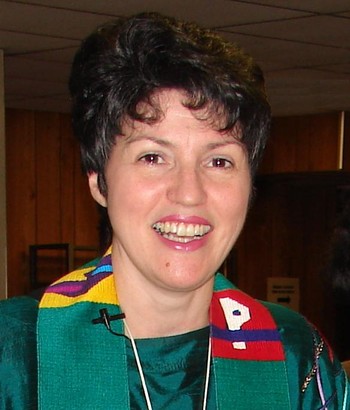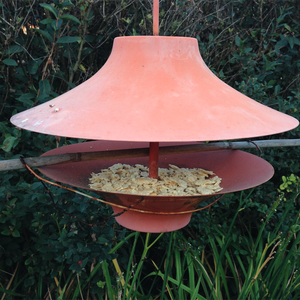A space for a contemporary woman disciple to give voice to justice concerns in a world where some still think that women’s words are just leros (Greek for “nonsense”) or, in Spanish, disparates
 A drop in the bucket
A drop in the bucket
A reflection and confession based on John 6:1–13
by Magdalena I. García
After this, Jesus went across the Sea of Galilee (some call it Tiberias). A huge crowd followed him, attracted by the miracles they had seen him do among the sick. When he got to the other side, he climbed a hill and sat down, surrounded by his disciples. It was nearly time for the Feast of Passover, kept annually by the Jews. When Jesus looked out and saw that a large crowd had arrived, he said to Philip, “Where can we buy bread to feed these people?” He said this to stretch Philip’s faith. He already knew what he was going to do. Philip answered, “Two hundred silver pieces wouldn’t be enough to buy bread for each person to get a piece.” One of the disciples—it was Andrew, brother to Simon Peter—said, “There’s a little boy here who has five barley loaves and two fish. But that’s a drop in the bucket for a crowd like this.” Jesus said, “Make the people sit down.” There was a nice carpet of green grass in this place. They sat down, about five thousand of them. Then Jesus took the bread and, having given thanks, gave it to those who were seated. He did the same with the fish. All ate as much as they wanted. When the people had eaten their fill, he said to his disciples, “Gather the leftovers so nothing is wasted.” They went to work and filled twelve large baskets with leftovers from the five barley loaves. —John 6:1–13, the Message
We’ve heard the legend
of the straw that broke the camel’s back.
It’s an Arabian fable about a merchant
who overestimated the limit of capacity.
One wisp was too much,
and it overcame the strength
of the beast crushed by the burden.
And we’ve read the tale
of the drop that filled the bucket.
It’s a Gospel narrative about a disciple
who underestimated the limit of generosity.
Five loaves and two fish seemed too little,
but they satisfied the stomachs
of the people burdened with hunger.
Forgive us, Doubling God,
for doubting your willingness
to duplicate our offerings.
Forgive us, Increasing God,
for doubting your ability
to multiply our drop in the bucket.
Forgive us, Abundant God,
for hiding behind scarcity
to avoid sharing our assets.
Forgive us, Accepting God,
for discounting the gifts from strangers
to treat them as a drop in the bucket.
Magdalena I. García is a PC(USA) teaching elder and a hospice chaplain for Vitas Healthcare in Chicago. She is a graduate of McCormick Theological Seminary and a recipient of the 2008 PC(USA) Women of Faith Award. For permission to use content, write to magdalenagarcia@comcast.net.
 Una gota en el balde
Una gota en el balde
Una reflexión y confesión basada en Juan 6:1–13
por Magdalena I. García
Después de esto, Jesús se fue al otro lado del Lago de Galilea, que es el mismo Lago de Tiberias. Mucha gente lo seguía, porque habían visto las señales milagrosas que hacía sanando a los enfermos. Entonces Jesús subió a un monte, y se sentó con sus discípulos. Ya estaba cerca la Pascua, la fiesta de los judíos. Cuando Jesús miró y vio la mucha gente que lo seguía, le dijo a Felipe: “¿Dónde vamos a comprar pan para toda esta gente?” Pero lo dijo por ver qué contestaría Felipe, porque Jesús mismo sabía bien lo que había de hacer. Felipe le respondió: “Ni siquiera el salario de doscientos días bastaría para comprar el pan suficiente para que cada uno recibiera un poco”. Entonces Andrés, que era otro de sus discípulos y hermano de Simón Pedro, le dijo: “Aquí hay un niño que tiene cinco panes de cebada y dos pescados; pero, ¿qué es esto para tanta gente?” Jesús respondió: “Díganles a todos que se sienten”. Había mucha hierba en aquel lugar, y se sentaron. Eran unos cinco mil hombres. Jesús tomó en sus manos los panes y, después de dar gracias a Dios, los repartió entre los que estaban sentados. Hizo lo mismo con los pescados, dándoles todo lo que querían. Cuando ya estuvieron satisfechos, Jesús dijo a sus discípulos: “Recojan los pedazos sobrantes, para que no se desperdicie nada”. Ellos los recogieron, y llenaron doce canastas con los pedazos que sobraron de los cinco panes de cebada. —Juan 6:1–13, Dios Habla Hoy
Hemos leído la leyenda
de la paja que quebró la espalda del camello.
Es una fábula árabe sobre un mercader
que sobreestimó el límite de la capacidad.
Un mechón fue demasiado
y venció la fuerza
de la bestia agobiada por la carga.
Y hemos leído el relato
de la gota que llenó el balde.
Es una narrativa del evangelio sobre un discípulo
que subestimó el límite de la generosidad.
Cinco panes y dos peces parecieron muy poco,
pero satisficieron los estómagos
de la gente agobiada por el hambre.
Perdónanos, Dios Redoblador,
por dudar de tu voluntad
para duplicar nuestras ofrendas.
Perdónanos, Dios Incrementador,
por dudar de tu habilidad
para multiplicar nuestra gota en el balde.
Perdónanos, Dios Abundante,
por escondernos detrás de la escasez
para evitar compartir nuestros bienes.
Perdónanos, Dios Aceptador,
por descartar los dones de los desconocidos
para tratarlos como una gota en el balde.